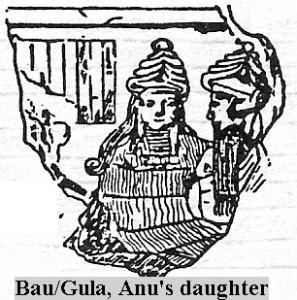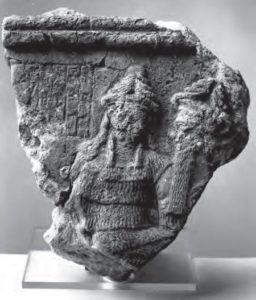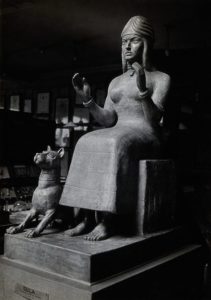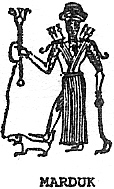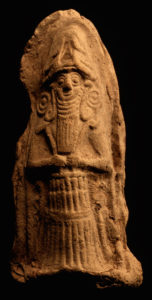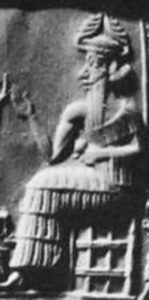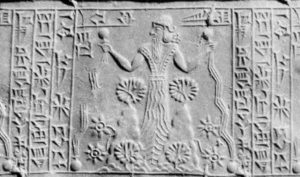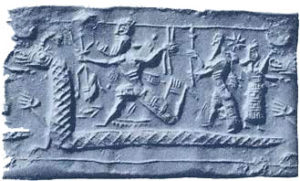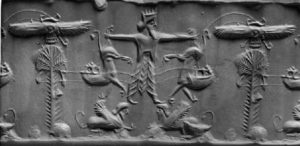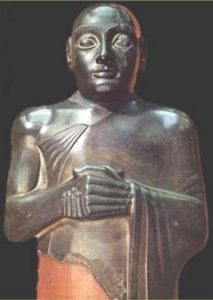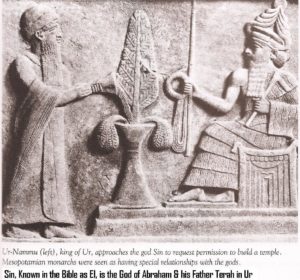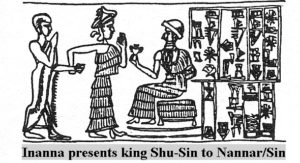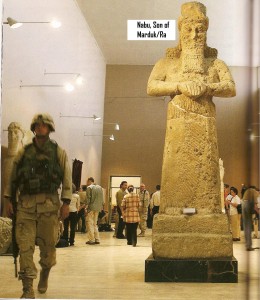The translation on this webpage was adapted from A.K. Grayson, Assyrian and Babylonian Chronicles (1975), Alan Millard’s rendering in W.W. Hallo (ed.), The Context of Scripture (2003 Leiden and Boston), and Jean-Jacques Glassner, Mesopotamian Chronicles (Atlanta, 2004).
The Weidner Chronicle (ABC 19) or Esagila Chronicle is a historiographical text from ancient Babylonia. In fact, it is not a chronicle but a piece of propaganda in the form of a letter, although it contains after line 31 a part that resembles a chronicle.
The presumed author, probably* king Damiq-ilišu of Isin (ruled 1816-1794, according to the Middle chronology), writes to king Apil-Sin of Babylon (1830-1813) about the blessings that the gods bestowed upon earlier rulers who sacrificed to the supreme god Marduk in the Esagila shrine in Babylon. Most of these kings ruled in the third millennium, when Babylon and the shrine probably did not exist.
(Texts: All Artifacts, Color Coding, & Writings in Bold Type With Italics Inside Parenthesis, are Added by Editor R. Brown, not the Authors, Translators, or Publishers!)
(gods in blue …mixed-breed demigods in teal…)
Translation
| Say to Apil-Sin (Rim-Sin king of Larsa 1,830-1,813 B.C.), king of Babylon, thus says Damiq-ilišu (Enlil-bani 1,816-1,794 B.C.), king of of Isin:* |
|
[…] like […] his reign. I myself have written to you a matter to be pondered, a matter […], but you have not considered them. You have not listened to or paid attention to the advice I gave you, nor heeded the special advice that […] You have been looking for something else. To do you a good turn I have […] you, but it is not in your mind. For your own good I have advised you to reinforce the training of your army, but you have not put your hand to it. His shrines where I sought advice […] has ceased. Now I shall tell you my experience […] learn from it speedily! I offered sacrifice to my lady Ninkarrak [Gula], mistress of Egalmah; I prayed an implored her, I told her the matter that I was constantly considering, and spoke like this: “Entrust to me the people of Sumer and Akkad […] all the lands. Let the people of the Upper and the Lower lands bring their weighty tribute into Egalmah.” In the night time, holy Gula, the exalted lady, stood before me, she heard my speech, spoke to me clearly and blessed me. “You shall set a place in the underground water, in the ocean beneath the earth, […] you shall raise the top to the distant sky, in […] above, a state of privilege. Afterwards, Marduk, the king of the gods, who […] the whole of heaven and earth, will […] the people of Sumer and Akkad to his city Babylon.” […] He [Marduk] went quickly to his father, Ea (Enki), the craftsman, the counselor of heaven and earth. “May Esagila, the majestic shrine, be […] to the limits of heaven and earth! May the lord of lords, who dwells in the shrine, from east to west […] May he shepherd human beings like sheep! May the city be famous! […] The lord Nudimmud [Ea] carried out all he had said. Throughout heaven he honored him. |
| 16′ Then Anu and Enlil, the great gods, favored him and decreed |
| 17′ “May he be the leader of the Upper and Lower lands |
| 18′ May the great gods of heaven and earth tremble before his shrine. |
| 19′ Raise up to the sky the top of Esagila, of Ekua, the palace of heaven and earth,[1] […] |
| 20′ May its foundation be fixed like sky and earth forever! |
| 21′ By your sacrifice I understood what you said and I have given to you long life. |
| 22′ Apart from the order announced in the dream, good advice for […]. |
| 23′ For the gods of that city, the great gods of heaven and earth […] |
| 24′ for daily, monthly, and yearly renewal of life […] |
| 25′ no god shall oppose it […] whose mind […] |
| 26′ at his command they are bound, the hostile gods clad in dirty clothes […] |
| 27′ Whoever sins against the gods of that city, his star shall not stand in the sky, |
| 28′ his kingship will end, his scepter will be taken away, his treasury will become a heap of ruins […]. |
| 29′ And the king of heaven and earth said thus: |
| 30′ “The gods of heaven and earth […] the behavior of each former king of which I hear to […]. |
| 31′ Akka, son of […] |
| 32′ Enmekar (2,800 + B.C.), king of Uruk, destroyed the people […]. |
| 33′ The sage Adapa (Enki fashioned “modern man”), son of […] |
| 34′ heard in his holy sanctuary and cursed Enmekar. |
| 35′ He/I gave to him rule over all lands and his rites. |
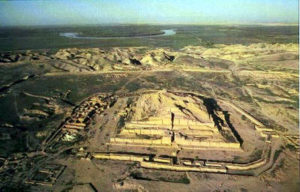 (E-sagila ziggurat temple residence of Marduk in Babylon) (E-sagila ziggurat temple residence of Marduk in Babylon)
36′ He/I beautified like the heavenly writing [2] and in Esagila the king |
| 37′ who controls the whole of heaven and earth for his 3,020 years. |
| 38′ In the reign of Puzur-Nirah, king of Akšak, the freshwater fishermen of Esagila
|
| 39′ were catching fish for the meal of the great lord Marduk; |
| 40′ the officers of the king took away the fish. |
| 41′ The fisherman was fishing when 7 (or 8) days had passed […] |
| 42′ in the house of Kubaba,[3] the tavern-keeper […] they brought to Esagila. |
| 42a’ At that time BROKEN[4] anew for Esagila […] |
| 43′ Kubaba gave bread to the fisherman and gave water, she made him offer the fish to Esagila. |
| 44′Marduk, the king, the prince of the Apsû,[5] favored her and said: “Let it be so!” |
| 45′ He entrusted to Kubaba (Kug-Bau, only queen 2,500-2,330 B.C.), the tavern-keeper, sovereignty over the whole world. |
| 46′ Ur-Zababa (Kish king 400 yrs.) ordered Sargon, his cupbearer, to change the wine libations of Esagila. |
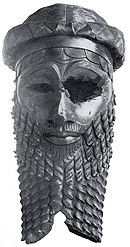 (Sargon the Great, giant mixed-breed appointed to kingship of Akkad, another spouse to Goddess of Love Inanna) (Sargon the Great, giant mixed-breed appointed to kingship of Akkad, another spouse to Goddess of Love Inanna)
47′ Sargon (2,334-2,279 B.C.) did not change but was careful to offer […] quickly to Esagila. |
| 48′ Marduk, the king of the world, favored him and gave him the rule of the four corners of the world.[6]. |
| 49′ He took care of Esagila. Everyone who sat on a throne brought his tribute to Babylon. |
50′ Yet he ignored the command Bêl (Enlil) had given him. He dug soil from its pit |
| 51′ and in front of Akkad he built a city which he named Babylon.[7] |
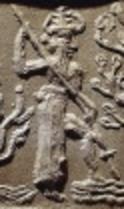 (Enlil, giant alien Anunnaki King Anu‘s son & royal heir to heaven / planet Nibiru, & Earth Colony) (Enlil, giant alien Anunnaki King Anu‘s son & royal heir to heaven / planet Nibiru, & Earth Colony)
52′ Enlil changed the order he had given and from east to west people opposed him. He could not sleep. |
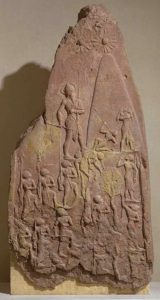 (Narram-Suen / Naram-Sin, giant descendant to Sargon, standing next to landed command module / alien “shem“) (Narram-Suen / Naram-Sin, giant descendant to Sargon, standing next to landed command module / alien “shem“)
53′ Naram-Sin (Akkad king 2,291-2,254B.C.) [8] destroyed the people of Babylon, |
| 54′ so twice Marduk summoned the forces of Gutium against him. |
| 55′ Marduk gave his kingship to the Gutian (primitive ape-looking mountain tribe) force. |
| 56′ The Gutians were unhappy people |
| 57′ unaware how to revere the gods, ignorant of the right cultic practices. |
| 58′ Utu-hegal (Uruk king 2,200 + B.C.),[9] the fisherman, caught a fish at the edge of the sea for an offering. |
| 59′ That fish should not be offered to another god until it had been offered to Marduk, |
| 60′ but the Gutians took the boiled fish from his hand before it was offered, |
| 61′ so by his august command, Marduk removed the Gutian force from the rule of his land and gave it to Utu-hegal. |
| 62′ Utu-hegal, the fisherman, carried out criminal acts against Marduk‘s city, so the river carried off his corpse. |
|
(Ur kings Shulgi 2,029-1,982 B.C.; & Ur-nammu 2,300 B.C. directed by giant alien gods) 63′ Then Marduk gave sovereignty over the whole world to Šulgi, son of Ur-nammu,[10] |
| 64′ but he did not perform his rites to the letter, he defiled his purification rituals and his sin [….]. |
| 65′ Amar-Sin (Isin king 1,895-1,874 B.C., short chrono.), his son, changed the offerings of large oxen and sheep of the Akitu festival in Esagila. |
| 66′ It was foretold that he would die from goring by an ox, but he died from the ‘bite’ of his shoe. |
| 67′ Šu-Sin (Ur king 1,972-1,964 B.C., short chrono.) made Esagila like the constellations for this well-being |
| 68′ BROKEN[4] what Šulgi did, his sin, his son Ibbi-Sin (Ur king 1,972-1,940 short chrono.).[11] |
| BROKEN a former king who proceeded […] your desire and over Marduk‘s father Ea (Enki), the heaven and earth […] he did not create. Anu and Ištar (Inanna), […] his majestic son, the great lord Marduk, king of the gods, whom the gods […], Ea‘s grandson Nabû, who […] he will name the king.
|
| To his descendant Sumu-la-El,[12] the king, whose name Anu pronounced, for your well-being and […] all of it a peaceful dwelling place, a lasting rule in your hand. |
| [13] Tablet of Marduk-etir, son of Etir-[…]-haya, devotee of Nabû. To be returned in case of loss. |
Note *:
This first line can also be read as “Say to Rim-Sin, king of Larsa, thus says Enlil-bani, king of Isin.”
Note 1:
A reference to the Etemenanki; cf. Genesis 11.4.
Note 3:
A legendary Sumerian queen and the only member of the Third Dynasty of Kiš. If she is a historical figure, her reign may have been in c.2400 BCE. She is also known as Kugbaba.
Note 4:
An indication by the writer that the tablet he was copying was damaged.
Note 5:
The sweet waters below the earth.
Note 6:
Sargon‘s reign can be dated to 2334-2279 (according to the Middlechronology).
Note 7:
Probably, the place names should be changed: if Sargon built a city near Babylon that he called Akkad, the anger of Enlil becomes understandable.
Note 8:
Naram-Sin was a descendant of Sargon and ruled, according to the Middle Chronology, from 2254 to 2218.
Note 9:
Utu-hegal was king of Uruk in c.2200. (son to Gilgamesh)
Note 10:
Ur-Nammu and Šulgi were the first kings of the Third Dynasty of Ur. According to the Middle Chronology, their reigns can be dated to 2112-2095 and 2094-2047. The third king, Amar-Sin, ruled from 2046 to 2038; Šu-Sin succeeded him in 2037-2029.
Note 11:
The fifth king of the Third Dynasty of Ur, Ibbi-Sin, ruled from 2028 to 2004 and was captured by the Elamites.
Note 12:
Sumu-la-El ruled 1880-1845 and was the (grand)father of the addressee of this letter.
